'A safety net for all their worries'
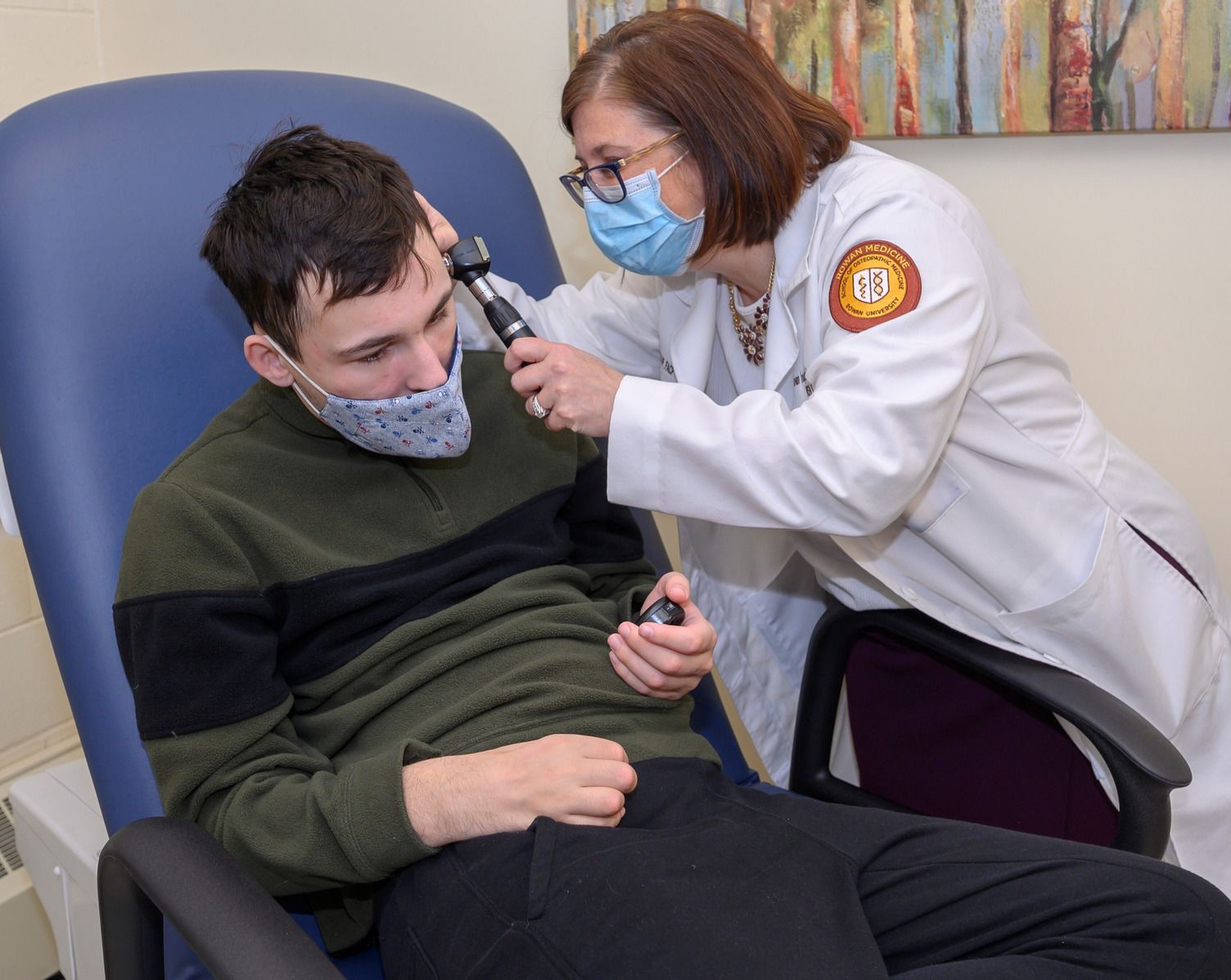
Finding comprehensive primary and behavioral health care for people with intellectual and developmental disabilities can be an impossible task. A special-needs center is teaching future doctors how to fill the gap.
At 22, Nicholas Iannuzzelli can’t tolerate long waits for his medical appointments. It’s no wonder.
Growing up, he saw many doctors to manage a complex list of conditions: a severe form of epilepsy, a nerve disorder, intellectual and developmental delays, autism, and a bout with a brain tumor.
Finding primary and behavioral health care for a child with special needs was hard enough, explained his mother, Dr. Andie Iannuzzelli. Finding comprehensive care that can accommodate an adult with special needs?
That can be nearly impossible, even for a parent who is a physician.
“There wasn’t any one place that I could find that offered primary care specifically for the special needs population that would be available to them to transition from childhood to adulthood,” said Dr. Iannuzzelli, who left her job as medical director of a retirement community to care for Nicholas full time when he turned 21.
Just when the Iannuzzelli family needed it most, Rowan University School of Osteopathic Medicine opened southern New Jersey’s first primary and behavioral health care center for individuals with intellectual and developmental disabilities and their families.
Staffed with a physician, a psychologist, a psychiatrist, social workers and more, Rowan Integrated Special Needs Center serves adults and adolescents, ages 14 and up, drawing patients from New Jersey, Pennsylvania and Delaware.
The center focuses primarily on the most vulnerable patients, including individuals with autism, brain injuries, Down syndrome, intellectual disabilities, cerebral palsy and other complex conditions originating in childhood, with a focus on care through adulthood. It also cares for the caregivers, who often neglect their own health needs to focus on their loved one.
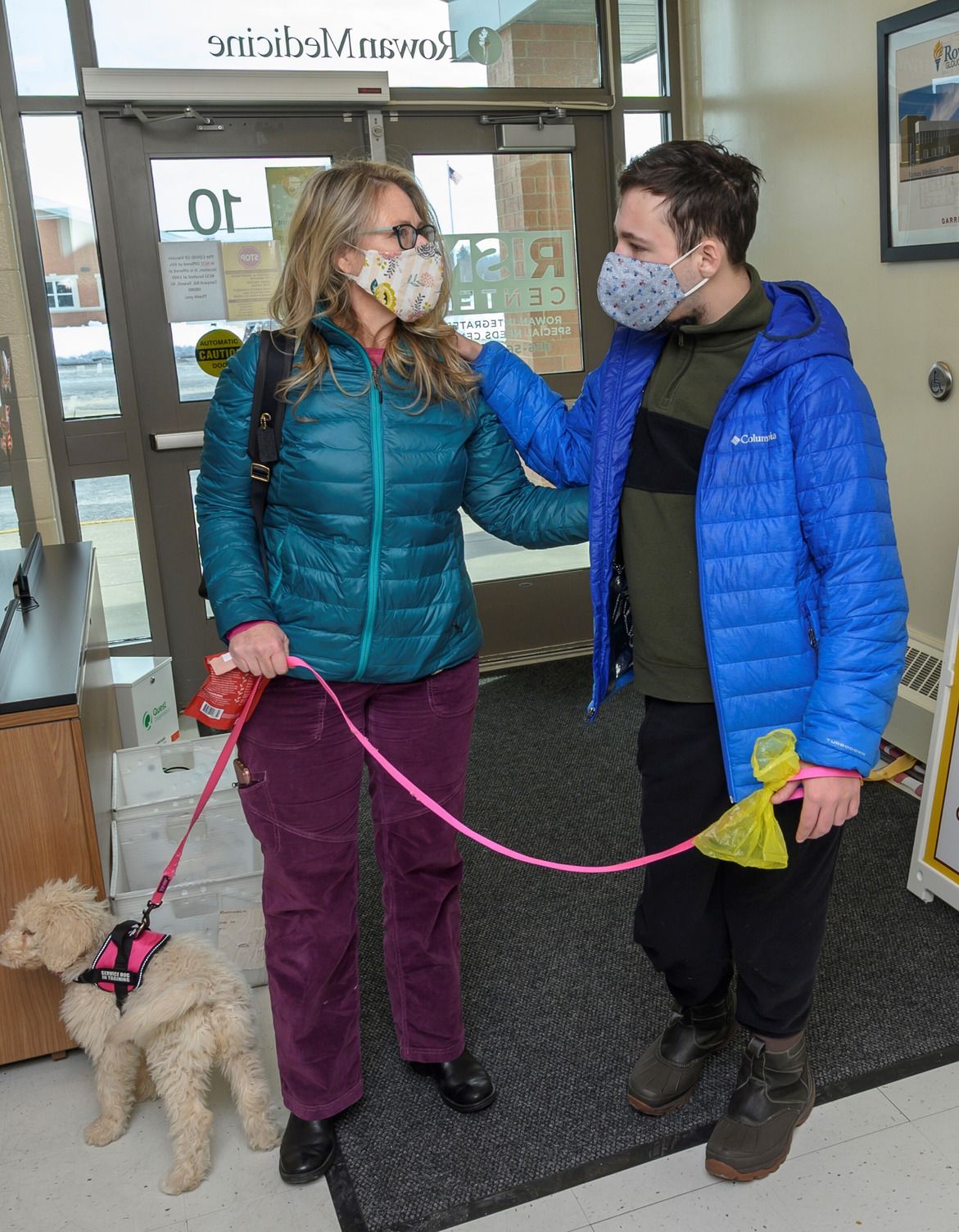
Dr. Andie Iannuzzelli (left) and her 22-year-old son, Nicholas Iannuzzelli, arrive with their service puppy, Daisy, at Rowan Integrated Special Needs Center in Sewell, N.J. The center focuses primarily on the most vulnerable patients, including individuals with autism, brain injuries, Down syndrome, intellectual disabilities, cerebral palsy and other complex conditions originating in childhood, with a focus on care through adulthood. It also cares for the caregivers, who often neglect their own health needs to focus on their loved one.
Dr. Andie Iannuzzelli (left) and her 22-year-old son, Nicholas Iannuzzelli, arrive with their service puppy, Daisy, at Rowan Integrated Special Needs Center in Sewell, N.J. The center focuses primarily on the most vulnerable patients, including individuals with autism, brain injuries, Down syndrome, intellectual disabilities, cerebral palsy and other complex conditions originating in childhood, with a focus on care through adulthood. It also cares for the caregivers, who often neglect their own health needs to focus on their loved one.
Finding comprehensive primary and behavioral health care for people with intellectual and developmental disabilities can be an impossible task. A special-needs center is teaching future doctors how to fill the gap.
At 22, Nicholas Iannuzzelli can’t tolerate long waits for his medical appointments. It’s no wonder.
Growing up, he saw many doctors to manage a complex list of conditions: a severe form of epilepsy, a nerve disorder, intellectual and developmental delays, autism, and a bout with a brain tumor.
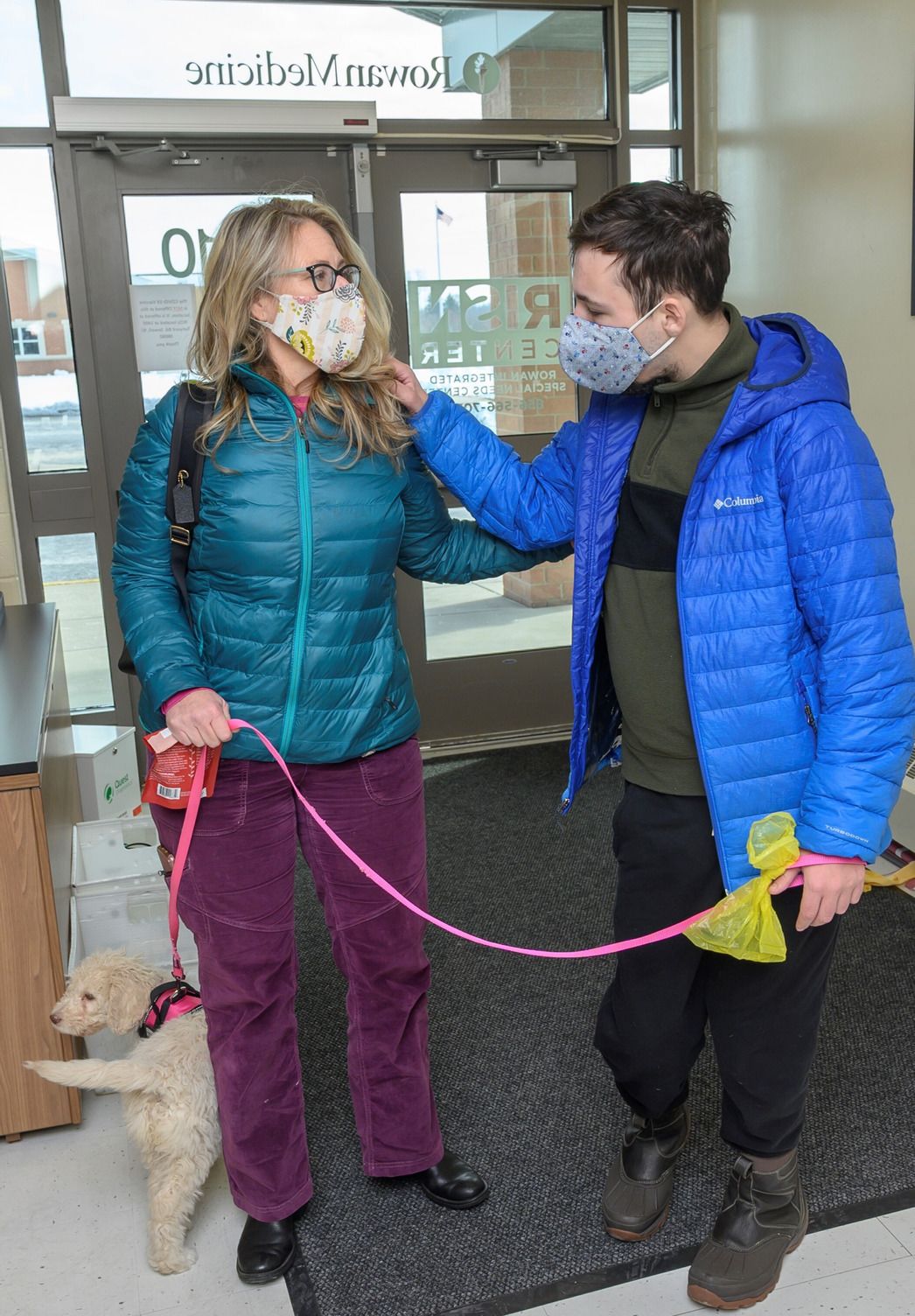
Dr. Andie Iannuzzelli (left) and her 22-year-old son, Nicholas Iannuzzelli, arrive with their service puppy, Daisy, at Rowan Integrated Special Needs Center in Sewell, N.J. The center focuses primarily on the most vulnerable patients, including individuals with autism, brain injuries, Down syndrome, intellectual disabilities, cerebral palsy and other complex conditions originating in childhood, with a focus on care through adulthood. It also cares for the caregivers, who often neglect their own health needs to focus on their loved one.
Dr. Andie Iannuzzelli (left) and her 22-year-old son, Nicholas Iannuzzelli, arrive with their service puppy, Daisy, at Rowan Integrated Special Needs Center in Sewell, N.J. The center focuses primarily on the most vulnerable patients, including individuals with autism, brain injuries, Down syndrome, intellectual disabilities, cerebral palsy and other complex conditions originating in childhood, with a focus on care through adulthood. It also cares for the caregivers, who often neglect their own health needs to focus on their loved one.
Finding primary and behavioral health care for a child with special needs was hard enough, explained his mother, Dr. Andie Iannuzzelli. Finding comprehensive care that can accommodate an adult with special needs?
That can be nearly impossible, even for a parent who is a physician.
“There wasn’t any one place that I could find that offered primary care specifically for the special needs population that would be available to them to transition from childhood to adulthood,” said Dr. Iannuzzelli, who left her job as medical director of a retirement community to care for Nicholas full time when he turned 21.
Just when the Iannuzzelli family needed it most, Rowan University School of Osteopathic Medicine opened southern New Jersey’s first primary and behavioral health care center for individuals with intellectual and developmental disabilities and their families.
Staffed with a physician, a psychologist, a psychiatrist, social workers and more, Rowan Integrated Special Needs Center serves adults and adolescents, ages 14 and up, drawing patients from New Jersey, Pennsylvania and Delaware.
The center focuses primarily on the most vulnerable patients, including individuals with autism, brain injuries, Down syndrome, intellectual disabilities, cerebral palsy and other complex conditions originating in childhood, with a focus on care through adulthood. It also cares for the caregivers, who often neglect their own health needs to focus on their loved one.
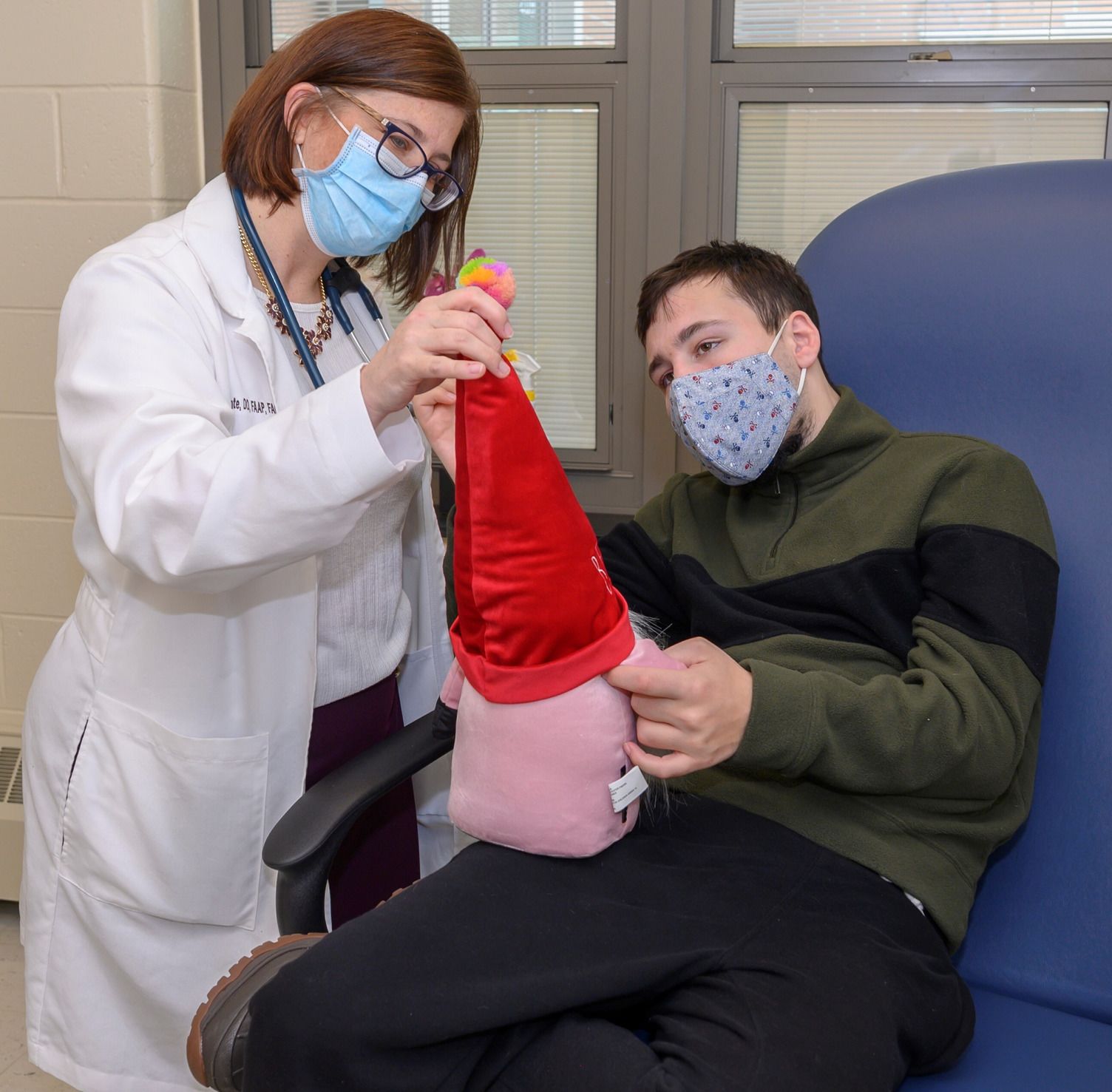
Dr. Jennifer LeComte, medical director of Rowan Integrated Special Needs Center, introduces a stuffed toy to her patient, 22-year-old Nicholas Iannuzzelli, during a routine physical exam. Historically, people with intellectual and developmental disabilities have poorer health, shorter lifespans and less access to high quality medical care. Children with disabilities transitioning into adulthood often encounter major barriers to adequate medical care and few primary care practices are fully accessible or properly equipped to treat them.
Dr. Jennifer LeComte, medical director of Rowan Integrated Special Needs Center, introduces a stuffed toy to her patient, 22-year-old Nicholas Iannuzzelli, during a routine physical exam. Historically, people with intellectual and developmental disabilities have poorer health, shorter lifespans and less access to high quality medical care. Children with disabilities transitioning into adulthood often encounter major barriers to adequate medical care and few primary care practices are fully accessible or properly equipped to treat them.
Overlooked, underserved
Historically, people with intellectual and developmental disabilities have poorer health, shorter lifespans and less access to high-quality medical care. Children with disabilities transitioning into adulthood often encounter major barriers to adequate medical care and few primary care practices are fully accessible or properly equipped to treat them.
Accessing basic medical care like routine cancer screenings, gynecological exams and blood work is a challenge for patients with intellectual and developmental disabilities, who are at an increased risk of developing common conditions like diabetes, hypertension and cardiovascular disease.
Roughly 35 percent of people with intellectual disabilities have a co-occurring mental health challenge, according to The NADD. In New Jersey, few behavioral health practices accept Medicaid, the most common insurance for patients with special needs. That means psychosocial services are often out of reach for families who need it most.
Coordination of care
Embedding behavioral health and care coordination into primary care for patients with special needs — as well as their caregivers — “is unique across the health care system,” said Dr. Jennifer LeComte, the center’s founding medical director.
“Often, people come to RISN Center thinking that they need psych care, LeComte said. "What they really need is just comprehensive care and a safety net for all their worries. That often leads to not needing psych care.”
The Iannuzzellis see RISN providers every three months or so, building trust and familiarity with each in-person and telehealth visit.
LeComte knows how to coax Nicholas Iannuzelli away from the bean bag chair and into the exam room. She knows which stuffed toy will soothe him and how to talk him through procedures like a blood pressure check or a needle stick, explaining the procedure and asking for permission with each step.
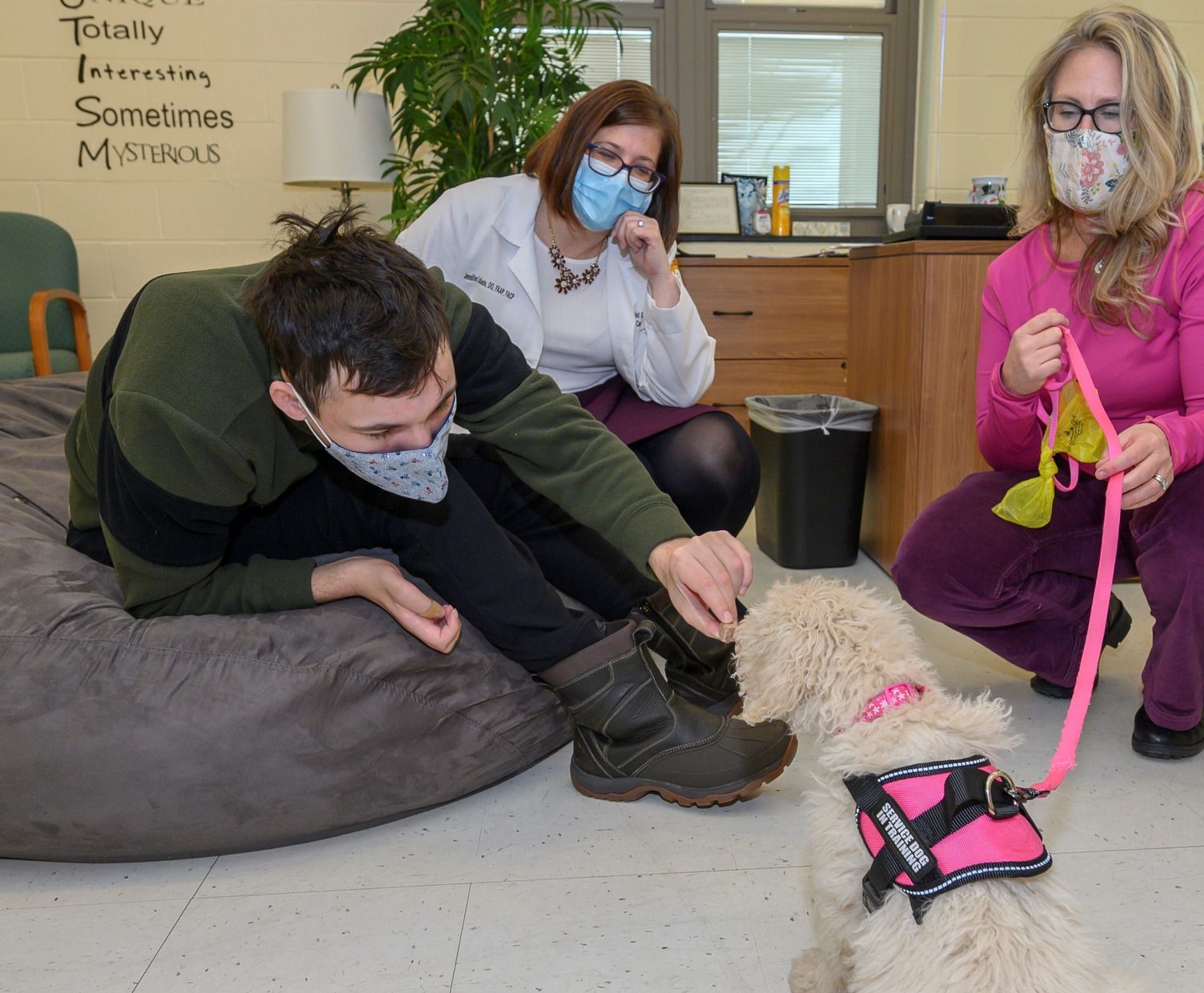
As he shares a beanbag chair with Dr. Jennifer LeComte, Nicholas Iannuzzelli (left) gives his new service puppy, Daisy, a treat in the waiting room at Rowan Integrated Special Needs Center in Sewell, N.J. His mother, Dr. Andie Iannuzzelli, found RISN just as her son aged out of the pediatric health care system.
As he shares a beanbag chair with Dr. Jennifer LeComte, Nicholas Iannuzzelli (left) gives his new service puppy, Daisy, a treat in the waiting room at Rowan Integrated Special Needs Center in Sewell, N.J. His mother, Dr. Andie Iannuzzelli, found RISN just as her son aged out of the pediatric health care system.
“Patients know themselves best,” LeComte said. “That’s why RISN Center is so patient-centered. You just have to ask the caregiver and the patient themselves. That model is really what we’re teaching our students, our residents and our colleagues — to include patients in the dialogue because they will answer the questions for you.”
Overlooked, underserved
Historically, people with intellectual and developmental disabilities have poorer health, shorter lifespans and less access to high-quality medical care. Children with disabilities transitioning into adulthood often encounter major barriers to adequate medical care and few primary care practices are fully accessible or properly equipped to treat them.

Dr. Jennifer LeComte, medical director of Rowan Integrated Special Needs Center, introduces a stuffed toy to her patient, 22-year-old Nicholas Iannuzzelli, during a routine physical exam. Historically, people with intellectual and developmental disabilities have poorer health, shorter lifespans and less access to high quality medical care. Children with disabilities transitioning into adulthood often encounter major barriers to adequate medical care and few primary care practices are fully accessible or properly equipped to treat them.
Dr. Jennifer LeComte, medical director of Rowan Integrated Special Needs Center, introduces a stuffed toy to her patient, 22-year-old Nicholas Iannuzzelli, during a routine physical exam. Historically, people with intellectual and developmental disabilities have poorer health, shorter lifespans and less access to high quality medical care. Children with disabilities transitioning into adulthood often encounter major barriers to adequate medical care and few primary care practices are fully accessible or properly equipped to treat them.
Accessing basic medical care like routine cancer screenings, gynecological exams and blood work is a challenge for patients with intellectual and developmental disabilities, who are at an increased risk of developing common conditions like diabetes, hypertension and cardiovascular disease.
Roughly 35 percent of people with intellectual disabilities have a co-occurring mental health challenge, according to The NADD. In New Jersey, few behavioral health practices accept Medicaid, the most common insurance for patients with special needs. That means psychosocial services are often out of reach for families who need it most.
Coordination of care
Embedding behavioral health and care coordination into primary care for patients with special needs — as well as their caregivers — “is unique across the health care system,” said Dr. Jennifer LeComte, the center’s founding medical director.
“Often, people come to RISN Center thinking that they need psych care, LeComte said. "What they really need is just comprehensive care and a safety net for all their worries. That often leads to not needing psych care.”
The Iannuzzellis see RISN providers every three months or so, building trust and familiarity with each in-person and telehealth visit.
LeComte knows how to coax Nicholas Iannuzelli away from the bean bag chair and into the exam room. She knows which stuffed toy will soothe him and how to talk him through procedures like a blood pressure check or a needle stick, explaining the procedure and asking for permission with each step.

As he shares a beanbag chair with Dr. Jennifer LeComte, Nicholas Iannuzzelli (left) gives his new service puppy, Daisy, a treat in the waiting room at Rowan Integrated Special Needs Center in Sewell, N.J. His mother, Dr. Andie Iannuzzelli, found RISN just as her son aged out of the pediatric health care system.
As he shares a beanbag chair with Dr. Jennifer LeComte, Nicholas Iannuzzelli (left) gives his new service puppy, Daisy, a treat in the waiting room at Rowan Integrated Special Needs Center in Sewell, N.J. His mother, Dr. Andie Iannuzzelli, found RISN just as her son aged out of the pediatric health care system.
“Patients know themselves best,” LeComte said. “That’s why RISN Center is so patient-centered. You just have to ask the caregiver and the patient themselves. That model is really what we’re teaching our students, our residents and our colleagues — to include patients in the dialogue because they will answer the questions for you.”
Care during COVID-19
The pandemic has been stressful for individuals with special needs, noted Dr. Wendy Aita, a psychologist and the center’s co-director. Mask-wearing, social distancing and disrupted routines are especially hard for people with intellectual and developmental disabilities, who suffer higher mortality rates due to COVID-19.
“Students are learning virtually, which can be a challenge for patients in special education who require a more hands-on approach,” Aita said. “Adults can no longer attend vocational and day programming, which was a vital source of respite and support for the individuals and the caregiver alike. As a result, there has been a rise in fear and behavioral health issues among individuals with special needs with a continued need to support their complex medical conditions.”
RISN Center aspires to be an evidence-based model of comprehensive care that leads to better outcomes and reduced health care costs. It’s also a training ground for medical school students, giving them experience they can carry throughout their careers. Recently, dozens of RowanSOM students volunteered to help vaccinate 52 patients and their caregivers against COVID-19, a complex endeavor that required individual care plans for each patient.
“It’s more imperative now than ever before for physicians to have some degree of comfort when it comes to dealing with this underserved population," said Dr. Ia uzzelli.
Some day, LeComte hopes, RISN’s ability to provide inclusive care will be the norm in health care. It’s what fuels her work at New Jersey’s largest medical school, where she can share her expertise with future providers.
“The demand far outweighs the supply of providers and physicians who are comfortable caring for this patient population,” LeComte said. “Being part of graduate medical education allows us to make more soldiers. Once we build that confidence, patients (with special needs) will be welcomed into practices, as opposed to having to create a clinic or an office just for them.”
To learn more about RISN Center, visit: https://centers.rowanmedicine.com/risn/
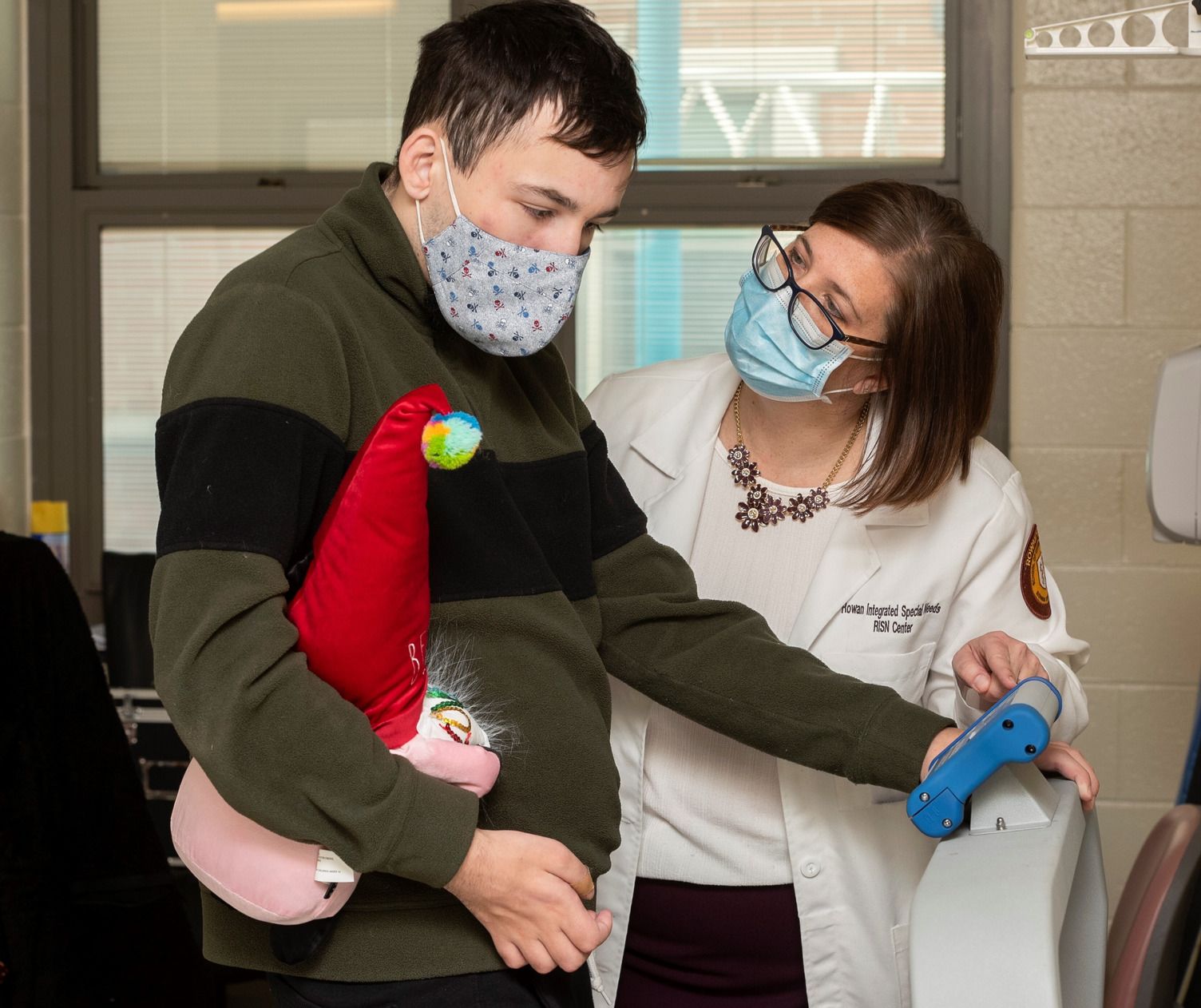
Dr. Jennifer LeComte (right) helps 22-year-old Nicholas Iannuzzelli weigh himself on the scale at Rowan Integrated Special Needs Center. Iannuzzelli sees a RISN provider every three months for primary and behavioral health care.
Dr. Jennifer LeComte (right) helps 22-year-old Nicholas Iannuzzelli weigh himself on the scale at Rowan Integrated Special Needs Center. Iannuzzelli sees a RISN provider every three months for primary and behavioral health care.
Care during COVID-19
The pandemic has been stressful for individuals with special needs, noted Dr. Wendy Aita, a psychologist and the center’s co-director. Mask-wearing, social distancing and disrupted routines are especially hard for people with intellectual and developmental disabilities, who suffer higher mortality rates due to COVID-19.

Dr. Jennifer LeComte (right) helps 22-year-old Nicholas Iannuzzelli weigh himself on the scale at Rowan Integrated Special Needs Center. Iannuzzelli sees a RISN provider every three months for primary and behavioral health care.
Dr. Jennifer LeComte (right) helps 22-year-old Nicholas Iannuzzelli weigh himself on the scale at Rowan Integrated Special Needs Center. Iannuzzelli sees a RISN provider every three months for primary and behavioral health care.
“Students are learning virtually, which can be a challenge for patients in special education who require a more hands-on approach,” Aita said. “Adults can no longer attend vocational and day programming, which was a vital source of respite and support for the individuals and the caregiver alike. As a result, there has been a rise in fear and behavioral health issues among individuals with special needs with a continued need to support their complex medical conditions.”
RISN Center aspires to be an evidence-based model of comprehensive care that leads to better outcomes and reduced health care costs. It’s also a training ground for medical school students, giving them experience they can carry throughout their careers. Recently, dozens of RowanSOM students volunteered to help vaccinate 52 patients and their caregivers against COVID-19, a complex endeavor that required individual care plans for each patient.
“It’s more imperative now than ever before for physicians to have some degree of comfort when it comes to dealing with this underserved population," said Dr. Ia uzzelli.
Some day, LeComte hopes, RISN’s ability to provide inclusive care will be the norm in health care. It’s what fuels her work at New Jersey’s largest medical school, where she can share her expertise with future providers.
“The demand far outweighs the supply of providers and physicians who are comfortable caring for this patient population,” LeComte said. “Being part of graduate medical education allows us to make more soldiers. Once we build that confidence, patients (with special needs) will be welcomed into practices, as opposed to having to create a clinic or an office just for them.”
To learn more about RISN Center, visit: https://centers.rowanmedicine.com/risn/
This content was paid for and created by Rowan University. The editorial staff of The Chronicle had no role in its preparation. Find out more about paid content.




